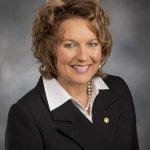
When it comes to politics, I really hate to paint anyone with one broad stroke of the brush. I especially don’t care for it when it happens to me. I pride myself on not getting pigeonholed with any one label because I don’t make a habit of checking with my ideological brethren before I make up my mind on a particular issue.
And, when it comes to politics, I’m much more passionate about what is going on in my community than I am with national issues. And, when it comes to local politics, it was once suggested to me that there shouldn’t be anything ideological about potholes, so whether one leaned to the right or left is far less significant on community matters than it is on federal issues.
That said, I won’t be offended if you label me as a fiscal conservative. I believe there is a fundamental truth that fiscal conservatives hold near and dear to their hearts that others do not. Evidence supporting that belief was illustrated front and center late last week as Washington lawmakers passed a new two-year, $43.7 billion state operating budget.
Senate Bill 5883, which enacts the new budget, passed with a vote of 70-25. House Bill 2242, which provides an additional $7.3 billion into K-12 education over the next four years (satisfying the McCleary Decision on Public Education Funding) passed with a vote of 67-26.
Southwest Washington lawmakers were a little less enthusiastic about the new budget than their peers around the state. In the House of Representatives, Republicans Liz Pike (18th District), Vicki Kraft (17th District), Brandon Vick (18th District) and Ed Orcutt (20th District) all voted against the budget while Republicans Paul Harris (17th District) and Richard DeBolt (20th District) and Democrats Monica Stonier (49th District) and Sharon Wylie (49th District) voted in favor of the budget.
In the Senate, Democrat Annette Cleveland voted against the budget and Republicans Ann Rivers (18th District), Lynda Wilson (17th District) and John Braun (20th District) voted in favor.
Even though those who voted against the budget likely knew it would pass comfortably, averting the threat of a government shutdown, they did so largely because of that fundamental truth that fiscal conservatives hold on to so passionately.

“I did not support the Operating Budget as it increases state government spending by 27% in just the next 4 years,’’ Rep. Kraft wrote on her Facebook page. “And even though we realized $3B (yes, that’s Billion) in new revenue this year due to a healthy economy, this budget added additional taxes and one-time revenue fund transfers for 11.9% ‘revenue growth’ in just the ’17-19 biennium.’’
Kraft told me earlier this year that Republican lawmakers have tried for years to persuade their Democrat counterparts to fund education first, because they know it is a priority and they are essentially now bound by McCleary to do so. If they did that, Kraft said lawmakers would then know exactly how much revenue would be left over to spread throughout the rest of the budget.
“The bottom line is if we would’ve prioritized Education by funding it first in the budget we could’ve funded it within existing revenues,’’ Kraft wrote. “Then like any household budget it comes down to living within our means, and not constantly taking money out of our neighbors’ pockets that isn’t ours to spend. My motto has been: fiscal responsibility and accountability are top priorities for our citizens.’’

Not only did Pike vote against the budget bill, she also voted against House Bill 2242 (the additional $7.3 billion for K-12 education over the next four years) and House bill 2163, which would enact several tax increases including sales tax on bottled water and self-produced refinery fuels, and collection of sales tax on internet sales.
“I sought elected office in the House so that I could work to reduce the size of government, lower taxes and protect our freedoms,’’ Pike said in a statement released Saturday. “When I looked at the budget numbers that we got in the past 24 hours, I was astounded to learn that it increases state government spending by 27 percent over four years. How can I justify supporting such a spending increase when I know almost no one I represent in the 18th District will be receiving a 27 percent increase in their salaries over the next four years?
“I’m very concerned that this bill commits future legislatures to unsustainable increases in the budget that could hit taxpayers hard, especially if our state suffers another economic downturn,’’ Pike said. “We all must remember that every dollar government spends is a dollar first earned by the hardworking taxpayers and the families of our state.
“I appreciate all of the negotiators who spent days and nights at the Capitol, trying to reach a budget compromise,’’ Pike said. “But I’m not willing to compromise the taxpayers in my district who struggle every day to make ends meet so that we can give government a 27 percent increase from their paychecks.”
This is one time when fundamental ideology, and lawmakers’ refusing to practice situational ethics, should be vital to taxpayers. I’m thankful for the legislators who refuse to turn their backs on their fiscal conservative beliefs no matter how much pressure there is to pass a budget, avert a government shutdown and satisfy the state Supreme Court’s McCleary decision.




